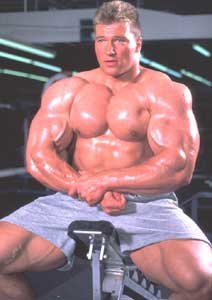 Well, I'm going to tell you that you should rest according to how you feel. I know this doesn't help you but if you really think about it, it does. How you ask? Well, getting a "feel" for your ability in the gym can only be achieved if you're mentally and physically focused. If you're wandering about the gym in between sets socializing with other avid social butterflies, then there is no way in hell you can focus. So if you can't focus, there is no way you can determine how your body "feels" in order to gauge proper rest time.
Well, I'm going to tell you that you should rest according to how you feel. I know this doesn't help you but if you really think about it, it does. How you ask? Well, getting a "feel" for your ability in the gym can only be achieved if you're mentally and physically focused. If you're wandering about the gym in between sets socializing with other avid social butterflies, then there is no way in hell you can focus. So if you can't focus, there is no way you can determine how your body "feels" in order to gauge proper rest time.
Rest time in between sets is paramount in a quality workout. Too much rest and you lose your pump. Too little rest and you quickly fatigue the working muscle. So you have to be able to get it just right in order to achieve optimal results. After all, results are what we're after, right? Now that we've agreed that rest time is important for good training, how do we go about gauging our rest times. Well, for most well trained individuals, 60-90 seconds is optimal rest time. It is a good rule to use because various studies have indicated that 60-90 seconds of rest is enough to recover about 90% of your muscle's capacity to do work.
There are schools of thought which say you should only rest about 30 seconds in between sets. Let me tell you a little something about resting only 30 seconds in between sets. You tire yourself out very quickly! Before you know it, you're having to crawl around the gym in order to complete your workout. That is NO good for strength. I have a friend who used to train 6 days on/1 day off for two hours a session and resting only 30 seconds in between sets. I think he suffered from a severe case of muscle dysmorphia because no matter what he did, he still "felt small." So to overcompensate for this, he decided to take the more is more approach knowing that it would do more harm than good. I got the privilege of training with this animal on a few occasions and let me tell you, it was no fricking joke! He was intense! Probably the most intense individual I have ever come across in my time. I recall training chest with him years back. I stepped foot in the gym and he grabbed me and said: "You're training chest with me today." I thought to myself: "cool, I get to train with Erik! He's a hoss!" Wrong! We did giant sets which included bench press, incline press, and decline press. All of that without a rest between the three. That was pure torture. I remember 135 feeling what seemed like 300 lbs.
Don't get me wrong because I am not saying little rest is bad for you but based on the way I've been training, I believe little rest such as 30 seconds does more harm than good for strength and size. Even when I prepare for a contest, I still keep my rest intervals around 60-90 seconds and let my cardio and dieting take care of the detail. If the muscle is there and you diet correctly, everything else falls into place. Now that I have addressed taking little rest intervals, I will address longer rest intervals.
Taking longer rest periods is more for strength than anything. It's pretty simple. The longer you rest, the more your muscles can recover from the previous set, and the more weight you can push and pull. However, you do run the risk of losing the much sought after pump and the rush of endorphins which gives you a natural high. I haven't had much experience with resting 3-5 minutes in between sets but I will leave it that way. Unless you're powerlifting, then you probably shouldn't rest that long. So all of you social butterflies out there who aren't powerlifters, shut up and lift!
Now the school of thought which I practice and preach: resting purely by "feel." On some days, you feel good and are ready for the physical and mental onslaught which awaits you before each set. On these days, you grab the weight and it is nothing but effortless motion. You seem to recover a little quicker than other days because you are well fed and well rested. The world is perfect. On other days, you're tired and lacking a bit of motivation. Your joints hurt and your body aches. You are underfed and under rested. Still, you push and pull your way to soreness. On these days, it takes a little longer to recover. The world is seemingly against you. Yet you fight and persevere. I know that we've all had our good days and bad days in the gym. It goes without saying. Your job is to pick out which days are better than others and choose appropriately how much rest you should really take. Doing this correctly isn't terribly difficult yet on the same token, it isn't too easy. You need to become one with your body because "what the mind can believe, the body can achieve." Once again, I recommend that you take no more than 90 seconds rest in between sets.
If you notice that your reps are dropping significantly in between these sets using the same poundages, then I recommend you take a little bit longer to rest. Maybe 2 minutes. But if you notice that your reps and poundages are staying about the same, then you could theoretically cut your rest time down a bit. If you ask me, I wouldn't cut the rest time down. Rather, I would increase the poundage for my next set. Then again, that's me and you may believe otherwise. At any rate, your eventual goal should be to shock the body using whatever shock method as you please whether it be increased poundages, decreased rest, giant sets, supersets, etc. Just remember, get a feel and use a little common sense when you train. Until next time, train hard and train smart!
